Dmitry Rasnovsky, GM Glovo Ukraine: “Mother told me: “First you think – then you do”. In Glovo we act – then think”
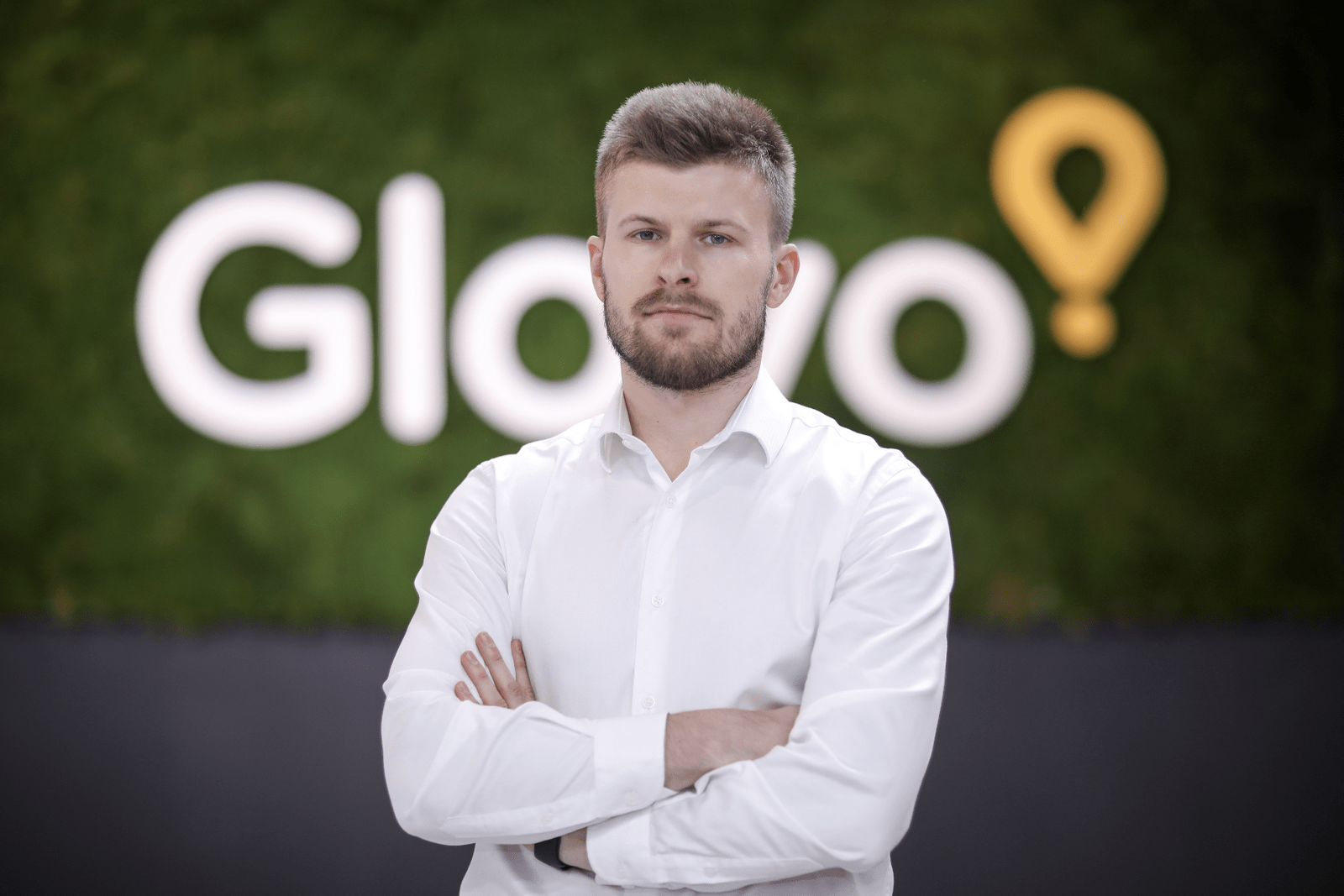
|
|---|
| Dmitry Rasnovsky, General Manager Glovo Ukraine |
– How did your work at Glovo start?
– At some point, Glovo began to consider the option of launching operations in Ukraine. One of the reasons is that Glovo has an investor with Ukrainian roots, the GR Capital fund. Definitely, the fund had a desire for Glovo to begin working in Ukraine. GR Capital knew me and recommended me as a candidate for the position of General manager. It was the year 2018. At that time I lived in Russia, worked at AVON and saw how food delivery is changing the industry. I understood the potential of Glovo in Ukraine, and I was inspired by the opportunity to work at Glovo. Besides, I wanted to return to Ukraine. So it all happened. December 12, 2018 was my first working day at Glovo.
– How was your first working day?
– I spent the first 2 weeks in Barcelona, at Glovo headquarters participating in the onboarding process. I met people in Barcelona with whom I had to work in the future. In parallel, I started making calls with the team that Glovo already had in Ukraine at that time.
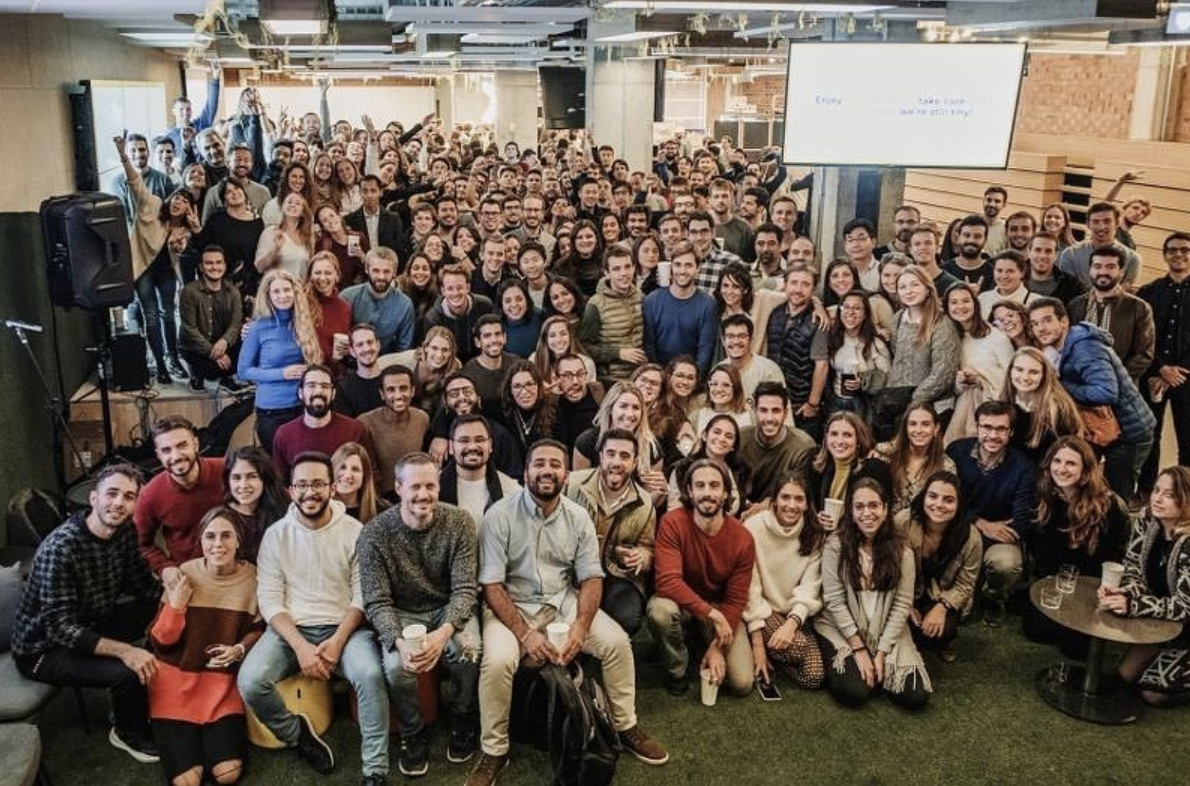
|
|---|
| International Glovo team in Spain |
– Was a team already shaped in Ukraine, when you joined?
– Not really. Glovo represents the model of the marketplace of the latest generation. Hence the launch strategy is the following. At first, “launchers” come to the country. They open a legal entity, hire the first people. Then a General manager and a senior team are hired. Such an approach is consistent with the vision of LinkedIn founder Reid Hoffman, which he described in his book “Blitzscaling”.
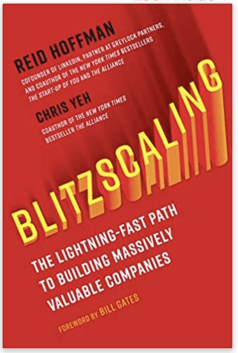
|
|---|
| Reid Hoffman, LinkedIn Founder, “Blitzscaling” |
Reid described the stages of company development. He said that in the beginning you have “special forces” that land on the market and seize the “bridgehead”. In the case of Glovo, these are the “launchers”. Then you need a regular army. These are the first senior people, including the General manager, who are conquering the market. When the market is conquered, you hire “cops” to keep order, procedures, take care of P&L, etc. Now Glovo is at the stage when we, as soldiers, are conquering the market. This approach was invented by Uber. It is described in the book “Super Pumped: the battle for Uber” about Travis Kalanick and his team.
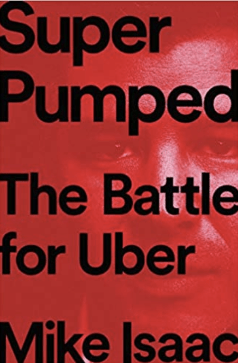
|
|---|
| Mike Isaac, “Super Pumped. The Battle for Uber” |
– How do you evaluate the work of “launchers” in Ukraine?
In Ukraine we had 2 launchers from Spain. When I arrived from Barcelona to Kyiv, they already did a great job and hired a Head of operations - a person to deal with couriers, Head of Marketing, Head of sales and 2 sales-people, several account managers to work with partners, a lady to work with content. Launchers managed to attract very cool people from great companies.
We hired experienced people from Genesys, Uber, decent FMCG companies.
These people continue to make their careers at Glovo today.
– How big was the team at Glovo Ukraine, when you joined the company?
– In December 2018, there were 11 of us. The first courier with a yellow backpack appeared on the streets of Kyiv in October 2018. When I arrived, the business was already working. The journey from 0 to 1 has already been completed. My task was to make millions out of 1.
– What did you do first?
– During the first week in Glovo I wanted to make sure that I understand well how the things work. When I arrived, the fire had just started. Kyiv looked like a small sandbox.
We knew that the potential of the food delivery market is billions of dollars per year.
I needed blitz scaling.
– How does Glovo achieve rapid growth?
– Food delivery is a marketplace that consists of 3 audiences: users, couriers, restaurants. We needed to persuade restaurants to start working with Glovo. For many restaurants, it was stressful even to think of giving 30% of their income for some imaginable orders to some kind of a no name brand – and Glovo in Ukraine was a no name brand in the beginning. Restaurants in Ukraine worked with Eda.ua and the Ekipazh Service and witnessed that food delivery brings them 5 orders per month. Restaurants did not see the market, and in our case, they did not see the profit either.
The second challenge for Glovo was to reach a critical mass of users. We needed to make people believe: yes, Glovo will deliver food to you in 45 minutes, and not in 2-3 hours. And the food will be warm. And it’s not dangerous to pay with a card in the application.
We needed to make couriers believe, that it is not a scam, that would be paid. Also we needed to train couriers to use the Glovo mobile app.
Marketplace only works when there are all the components. No couriers - we can’t deliver. No users - no one to deliver. No restaurants - nothing to deliver. It is necessary to create such a first spark so that the fire flames up and the first feeling of the balance appears. When there is a sense of balance, you can begin to grow gradually in all directions.
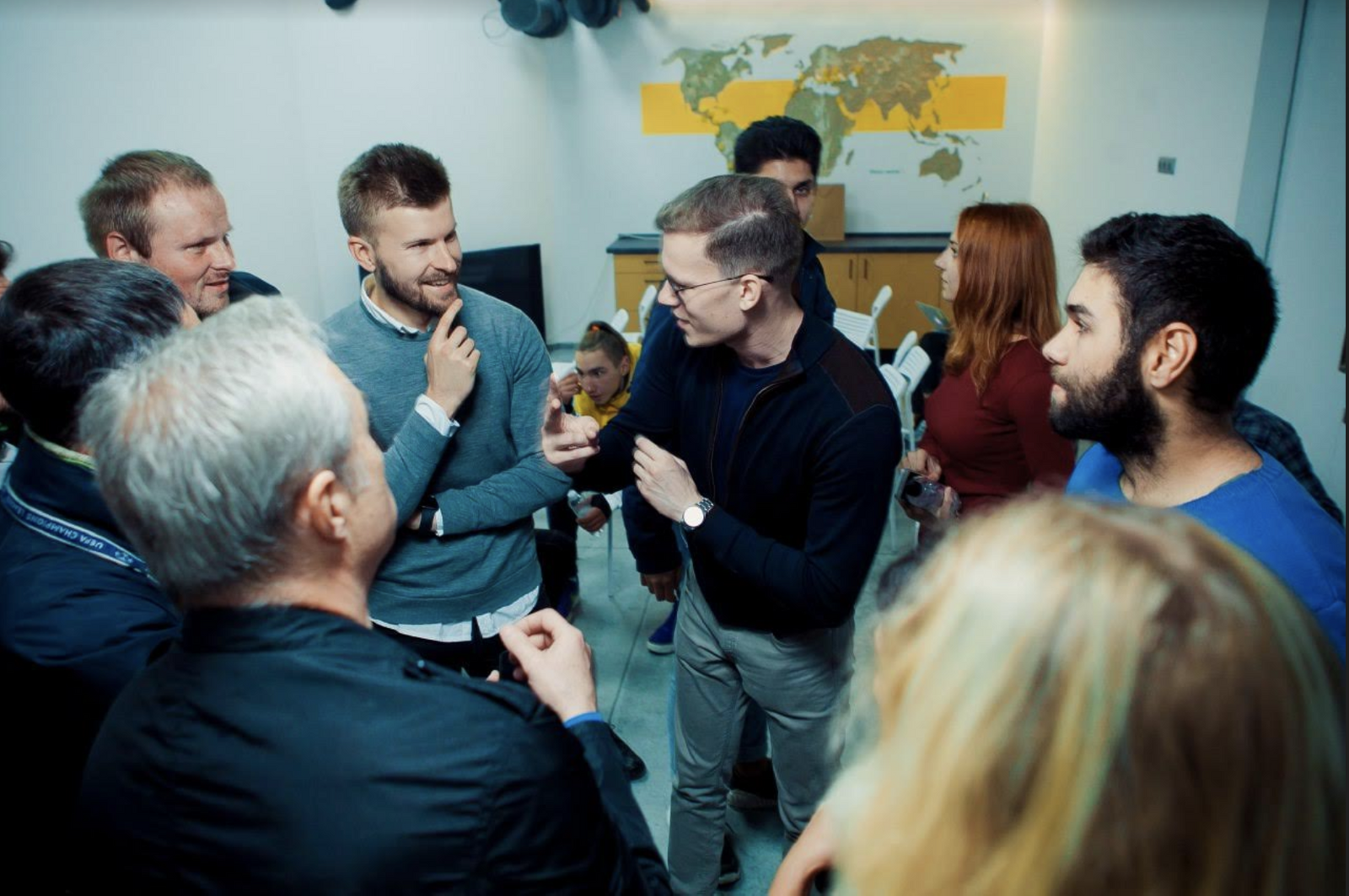
|
|---|
| D.Rasnovsky: “It is important to create the first spark” |
– How did you manage to achieve such a balance in Ukraine?
– Glovo has a number of smart strategies. For example, we used fake brands. That is, for users, we showed offers from restaurants, with which we had not yet reached an agreement. This allowed us to show restaurants the potential: this is how many orders really can be. On the other hand, when a user entered the application, he saw N restaurants, not one.
– Did Glovo have competition in Ukraine, when you started?
– In February 2019 Uber Eats launched in Ukraine. We had 5 months handicap before the launch of the closest competitor. Also Eda.ua and Ekipazh Service were active on the market. However, Glovo had a significant technological advantage. We were able to deliver orders in 45 minutes. And also we had faith in the market. Other players did not try to invest and grow the market. They took the market from 2 cents, tried to divide it and make it profitable. At Glovo we were looking at examples from other countries and realized that Ukrainian market is not about 2 cents. This is a billion dollar market. So before you divide the market, you need to bring it closer to such a volume.
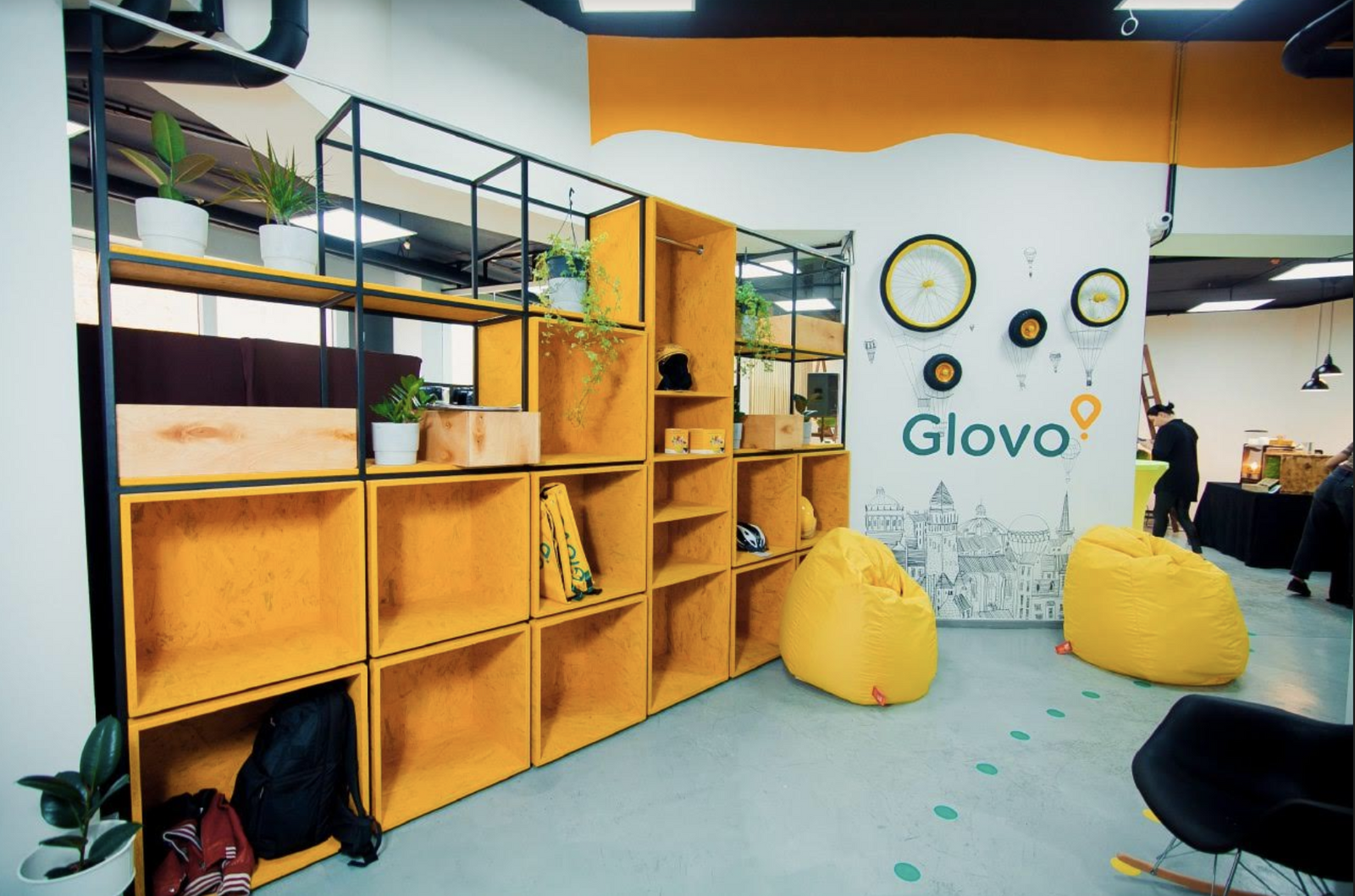
|
|---|
| Glovo-center, Kiev |
– Can you name the key achievements during the first years at Glovo?
Over the first six months, the team and I managed to grow 100 times in the number of transactions.
– Did you celebrate?
– No. There was no time. New challenges constantly appeared. Another achievement is that we managed to defend our leadership position against Uber Eats. Uber had a technological advantage. They operated longer in the market in Ukraine, they had substantial marketing budgets, there was a large base of ride hailing users who were used to paying with a card and who could be easily invited to order in Uber Eats. Uber is a strong competitor. The fact that we managed to defend our positions from the very beginning, I believe, is our achievement. Also, over the past six months, we have launched operations in all major cities of Ukraine.
Having a fairly small team, we constantly lived in launch mode.
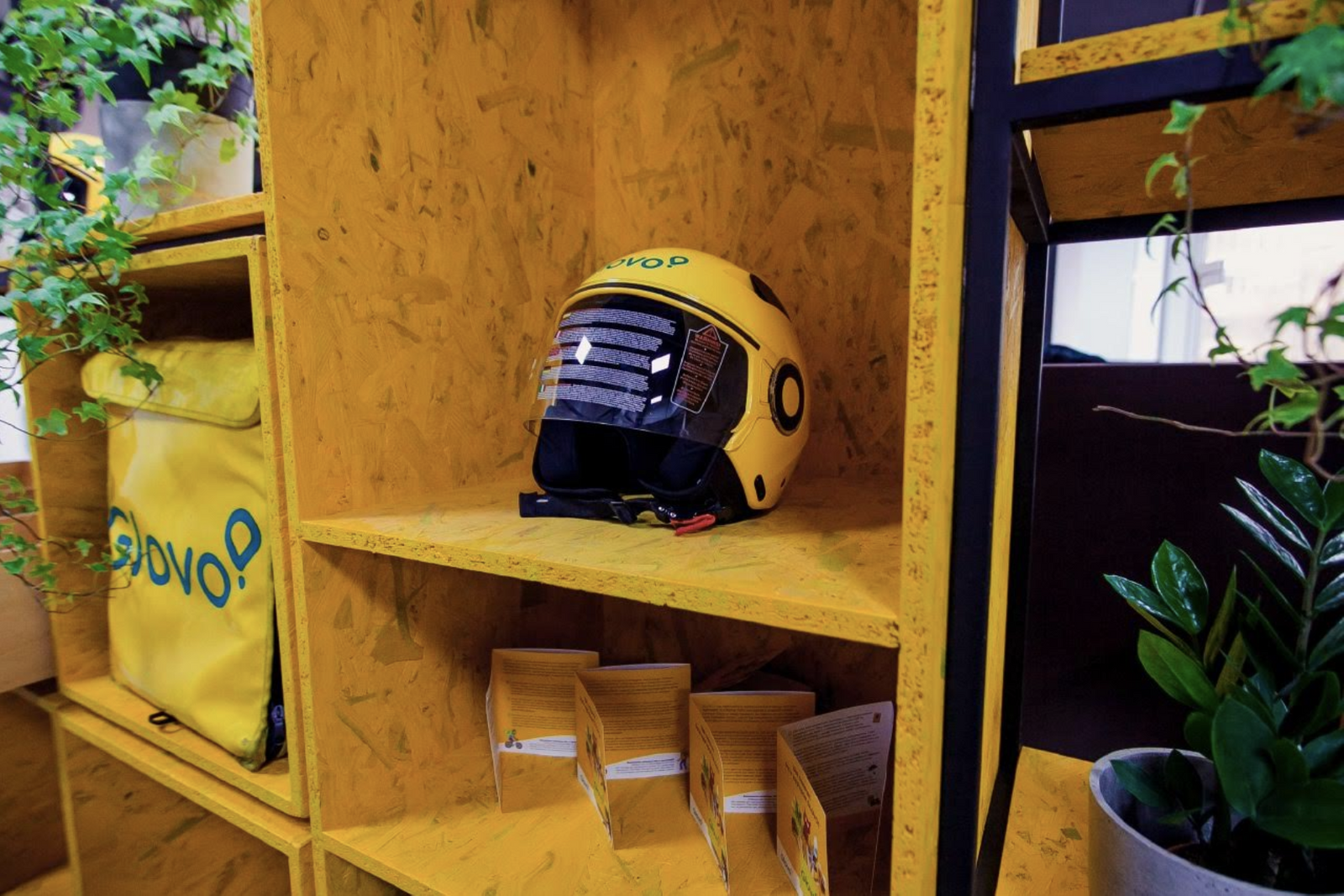
|
|---|
– Can you describe the key “growth points"?
– Growth points are different. First, we extensively launched new territories. First, we launched operations in the Kyiv city center, then expanded, launched the left bank, then big cities. New deals brought us more customers. For example, McDonald’s, Salateira, Vietnamsky privet – these were remarkable deals.
– Have you made any unexpected marketing discoveries?
– Yes. There were some funny stories. Once there was a scandal when a girl who worked in the Parliament canteen posted a picture on social networks where delivery to the deputies was marked with the “XYU” label. The media picked up and fanned the story. At first, everyone thought that this was an unfortunate joke of one of our couriers. Then it turned out that McDonald’s managers take the last 3 letters on the order from the accounting system. It so happened that these letters were “X, Y, U”.
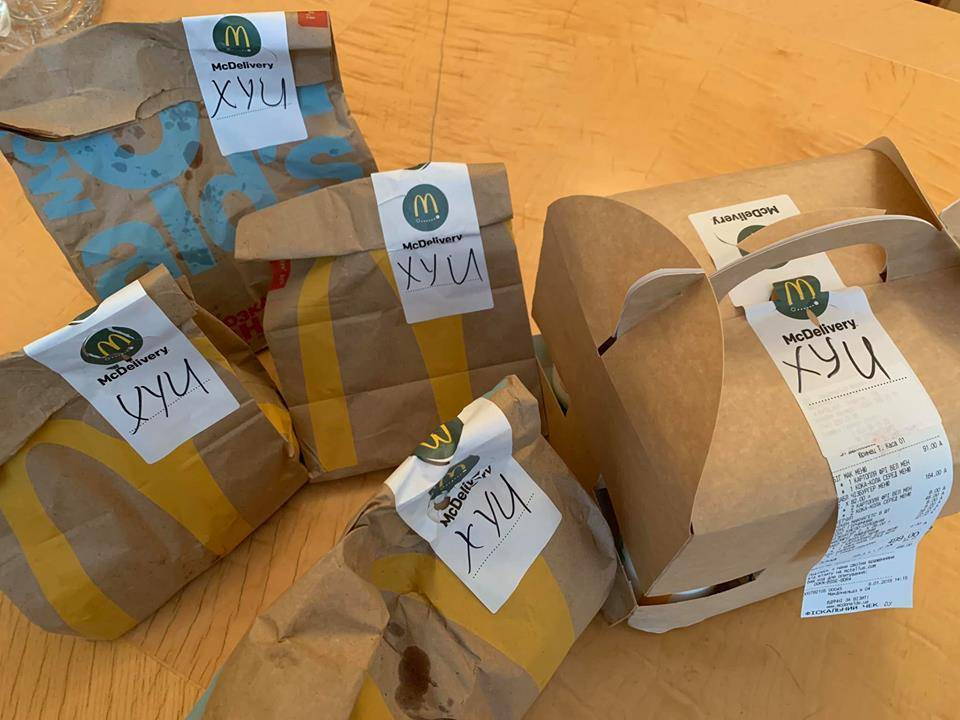
|
|---|
| Source: MC.Today |
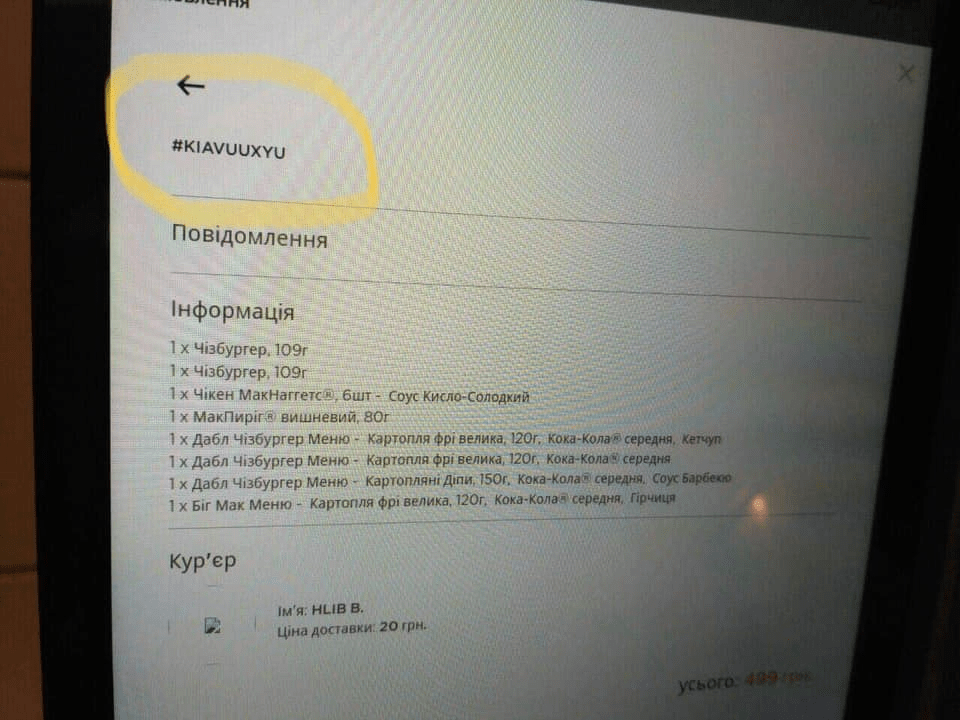
|
|---|
| Source: Mc.Today |
The next day we saw a 35-40% increase of orders at Glovo. Many people found out about the existence of Glovo after that scandal.
– What factors are most important for Glovo growth?
– Everything is made up of small but constant efforts. It is important to experiment a lot. To quote Tony Xu, CEO of DoorDash (a food delivery service in San Francisco), 3 things are important for food delivery: pricing, content, and quality of operations. In terms of pricing, we introduced free delivery at the launch of Glovo. We encouraged people to try the service. Regarding the content - we did our best to have as many cool famous brands as possible in the application. By the quality of operations - we tried to ensure that the client received food hot or warm. We needed to form a habit.
– What is a “habit” in numbers?
– If we have a high acquisition rate but low retention, we don’t like it.
If we attracted 10,000 new users per week, of which 90% churned after the first order, we do not need such an acquisition. It is important to maintain the quality of operations.
It is necessary that people who used Glovo for the first time get good experience and say: “Ok! I will order again. ”
– Do you have a good retention rate?
– The world benchmark is considered to be about 20-28%. It is a good month over month retention rate for the new customers. We are doing better than that.
– What does the Glovo landscape look like from an IT perspective?
– We have 3 front-end applications: for courier, restaurant and user. Behind them there is a backend. These are all proprietary solutions created by the HQ Glovo team in Barcelona. Why developed in-house? Because food delivery is a young industry. And there are no such solutions that you can just take, tailor and start using. There are specifics of working with content, users, couriers. There really are many things that lie under the hood and make all this magic scalable. On the one hand, modern people have got enough smartphones. On the other hand, technologies appeared that make it possible to efficiently solve logistics problems in real time. It is necessary to distribute orders between couriers so as to minimize delivery time and maximize courier revenue.
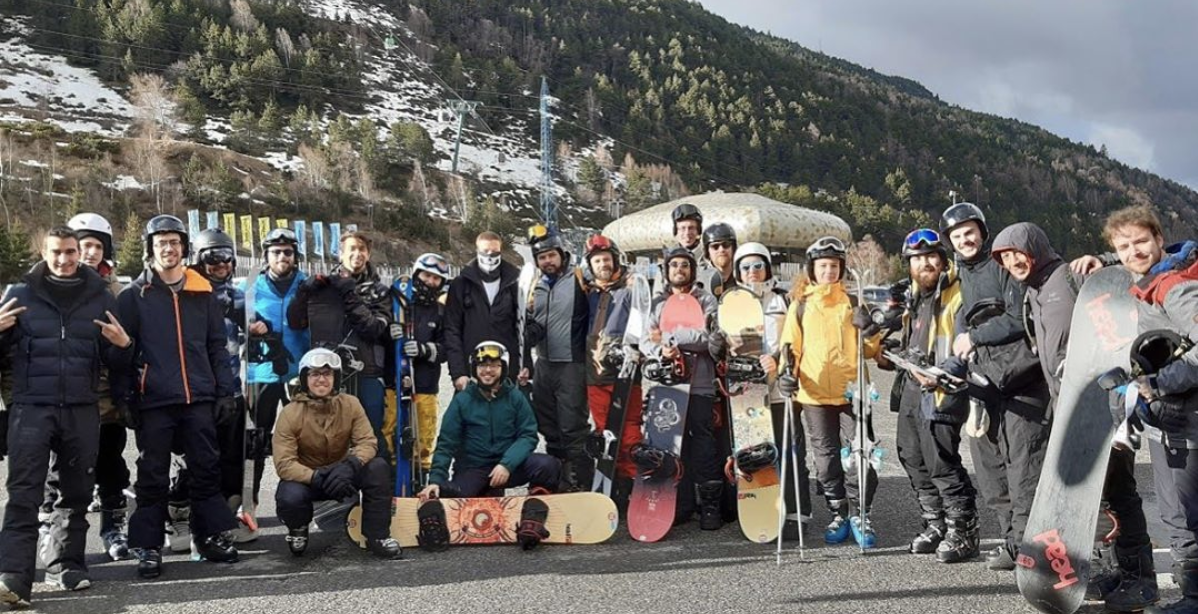
|
|---|
| Glovo developers at team building event |
Previously, the call center was engaged in the distribution of orders in such businesses. It turned out that the more orders you have - the more employees are needed to process orders. You have a large variable cost that grows with you, and also it is not effective. In Glovo, distribution of orders is a technology which cost is fixed, plus it works much better than manual processing of orders.
We also have ERP systems for invoicing, the American Kustomer CRM system for support services, SalesForce for sales people, a set of tools for sending communication and newsletters. There is also a front end - Looker (recently acquired by Google) and various analytics services like Adjust, Singular.
– How did the cooperation between Glovo and Middleware start?
– Glovo has many systems that are not yet integrated or poorly integrated.
– Why did this happen?
– My mother used to tell me: “First think - then do”. Glovo does it vice versa. The company teaches me: “First you act, then you think.” Speed decides. I believe that due to the speed we are winning against Uber Eats in Ukraine. I recommend Nicholas Johnson's book, “Modern Monopolies”. The author talks about the magic of marketplaces that have become monopolies – marketplaces in the broadest sense, like Facebook, Adyen, etc. The secret to success lies in the network effects. The more connections you have between the platform participants, the better. Each new relationship affects the exponential growth of the value of the network as a whole. Therefore, it is important to move fast in marketplaces. And Glovo moved fast.
If you look back, Glovo over its 5-year history was able to overtake or seize the share of many players in the food delivery industry simply because the company was moving faster.
When moving fast and when “done is better than perfect”, it’s important to understand that there is a big gap between “done” and “perfect”. And it is revealed everywhere. Including in the things you do with technology. So we have a lot of bottlenecks. Some APIs are not there or don’t perform well.
In 2018, we began to solve the problems of integrating our systems with partners, with restaurants. In most cases, the food delivery project starts like this: we distribute tablets to restaurant employees, they watch how orders come, and start to do something. This approach is not very effective. A restaurant employee may “yawn”, and not notice a new order.
However, if the order gets immediately into the queue system of the restaurant – this is another situation. The amount of time the courier spends waiting gets reduced. The restaurant quickly notices the order and completes the order faster. Also, problems with reconciliation at the end of the period disappear. If you have tablets, then we at Glovo take data from our application, because we do not have another source of truth. And the restaurant takes data from its ERP system. They think: “Well, some kind of application. Anything can be there. We want to see what really was done in our system.” Due to a variety of reasons, discrepancies may occur.
Therefore, with top partners, we wanted to integrate directly. But each partner has his own system. At Glovo, because the company is moving very fast, there is a tight prioritization of IT tasks. When there is a choice – to integrate partner A in Ukraine or to make some feature globally, it is clear that the feature wins.
In Ukraine we realized that each time integrating a new partner as if we were doing it for the first time, – it is very painful.
I knew about Corezoid. And I knew that there is a Middleware company that approaches things in a smart way and offers scalable solutions.
Now Middleware allows Glovo to integrate new partners much faster.
Also at Glovo you need not only to manage the order, but also display the menu in a beautiful way. One situation is when you have McDonald’s, whose menu everywhere is almost the same and for the same price. Another kind of situation is Silpo, where at each separate location there is its own assortment and its own pricing. That is, on the one hand, we had a clear problem, and on the other hand, lack of capacity in the global team. Thus we started using Corezoid at Glovo.
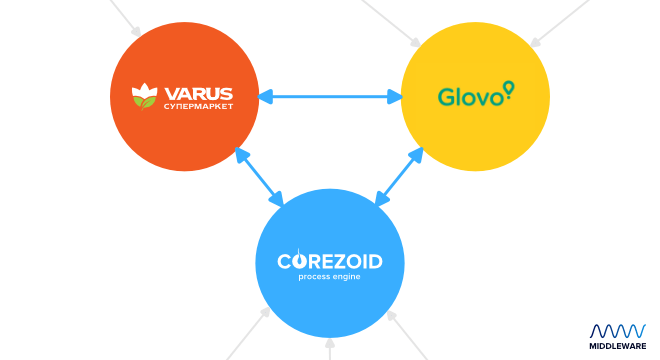
|
|---|
| Integration between Glovo и VARUS accomplished in the record 5 days. In 2 weeks Middleware and Glovo integrated 8 merchants (with and without APIs). |
– Does HQ know about Corezoid?
– HQ are glad that we have resolved our problems without distracting them. In my opinion, you do cool things, and it makes sense for the company to do something on Corezoid globally.
– What are Glovo's next plans for Ukraine?
– In Ukraine, we still have a long way to grow the market. In a country where 40 million people live, we know that the market must be of a different size. Now we are on the right track. Of course, in the situation with coronavirus, on the one hand, people are sitting at home and they have more reasons to try any online service, not only Glovo, but also online movie theaters, online banking, etc. At the same time, we need to increase the delivery distance, many restaurants are closing, the amount of money in the system is decreasing, people are sitting on unpaid vacations, and the unit economy as a whole is deteriorating. There are pros and cons. I am sure that after quarantine many people will remain with Glovo.
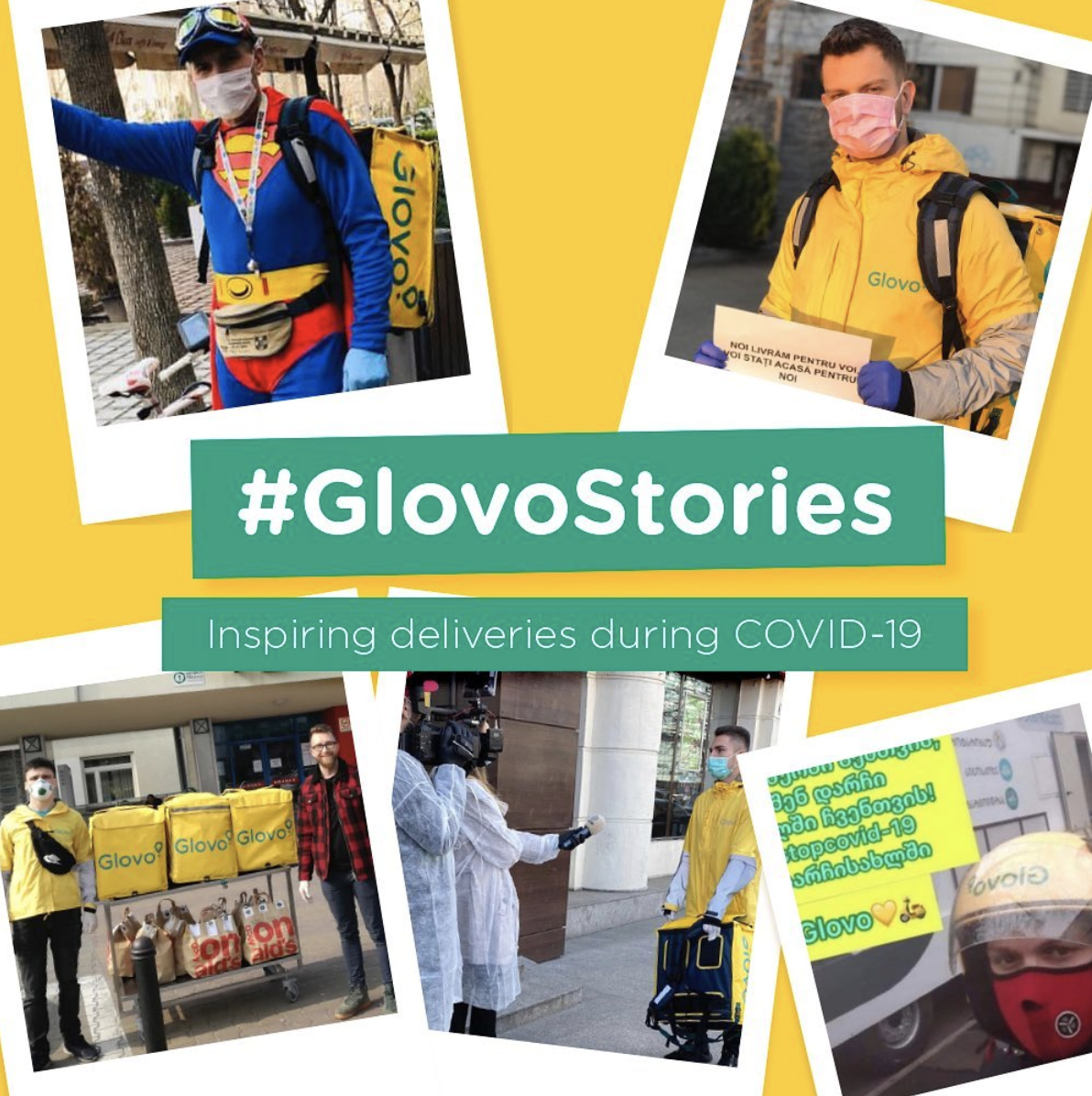
|
|---|
| Glovo heroes with yellow rucksacks |
– Can you please recommend some books to our readers?
– Listen, I read tons of books. Three years ago I saw an article that Mark Zuckerberg read 52 books in a year.
I then realized that if Mark can find the time to read a book a week, being a more busy person than me, then I have no excuses not to do the same.
And for 3 years in a row, I also read 52 books a year.
I’d rather say what I liked lately and marked as “5” on Goodreads.

|
|---|
I recommend “Super Pumped. The battle for Uber”. The book describes the era of Travis Kalanick. There are a lot of interesting ideas, and a lot of things that shocked me. I better understood why the ride-hailing industry, the food delivery industry went this way and not otherwise. Uber is a great company. They introduced a set of trends and standards in the world that are still relevant.
In the book “The Culture Map”, Erin Meyer talks about metrics to measure people's cultural traits. For example, in relation to time, relation to the escalation of conflicts. It helps to read colleagues. Especially when you work in international companies. Many things that do not seem OK to us in Ukraine, they are OK in other countries. And vice versa. For example, Ukrainians are often perceived as a conflict nation, too straightforward. Many people in the West consider such a behavior offensive. But in fact, we are simply more open and try to be more frank.

|
|---|
| Life at Glovo: Buenos Aires, Argentina |
I liked the book “What you do is who you are”. This is a book about corporate culture. One of the things that I came across at Glovo is that it’s important not only what the company does, but how it does it. The culture that Glovo is trying to cherish in employees and the behavior that the company is driving, it largely determined the fact that we were able to do many things better, faster and cheaper than competitors.
– What is special about Glovo corporate culture?
– There are 5 core values that a company wants to see in a person. This is GLOVNERSHIP. That is the pun of “Glovo” and ownership. People should treat what they do as their own. Therefore, we are talking about maximum responsibility and everything that follows from this.

|
|---|
| 5 core values of Glovo |
The second is GAS. It's like a gas pedal. We are fast.
I have 3 types of deadlines in Glovo: “today”, “until the end of the week” and “until the end of next week”. When I hear other deadline options, I become nervous.
If we launch a city, we launch it in a week. We are preparing as much as possible to do the job well, but the downsides are also understandable.
Third is GOOD VIBES. The company understands that if you move fast, then there is a set of trade-offs that you need to consider.
Things may not be perfect when moving fast.
Between people, conflicts inevitably arise. One way or another you hurt someone. And now the company wants us to resolve all conflicts in a friendly and positive manner.
Fourth is HUMBLE. People should be humble. I don’t know how much this was done intentionally, but after reading the book “Super pumped” about Uber, it seems to me that this is one of the metrics where Glovo wants to do things NOT like Uber. Kalanick said: “Always be hustling.” We are humble.
And the fifth is CARE. We at Glovo care about what surrounds us and think about how our actions affect the country, the environment, everything connected with us. The company even has a Director for sustainability. We are engaged in eco-packaging, there is a set of charity programs. For Glovo, this is not a PR and not a way to tell what good fellows we are, but really the desire to be a responsible part of the community.
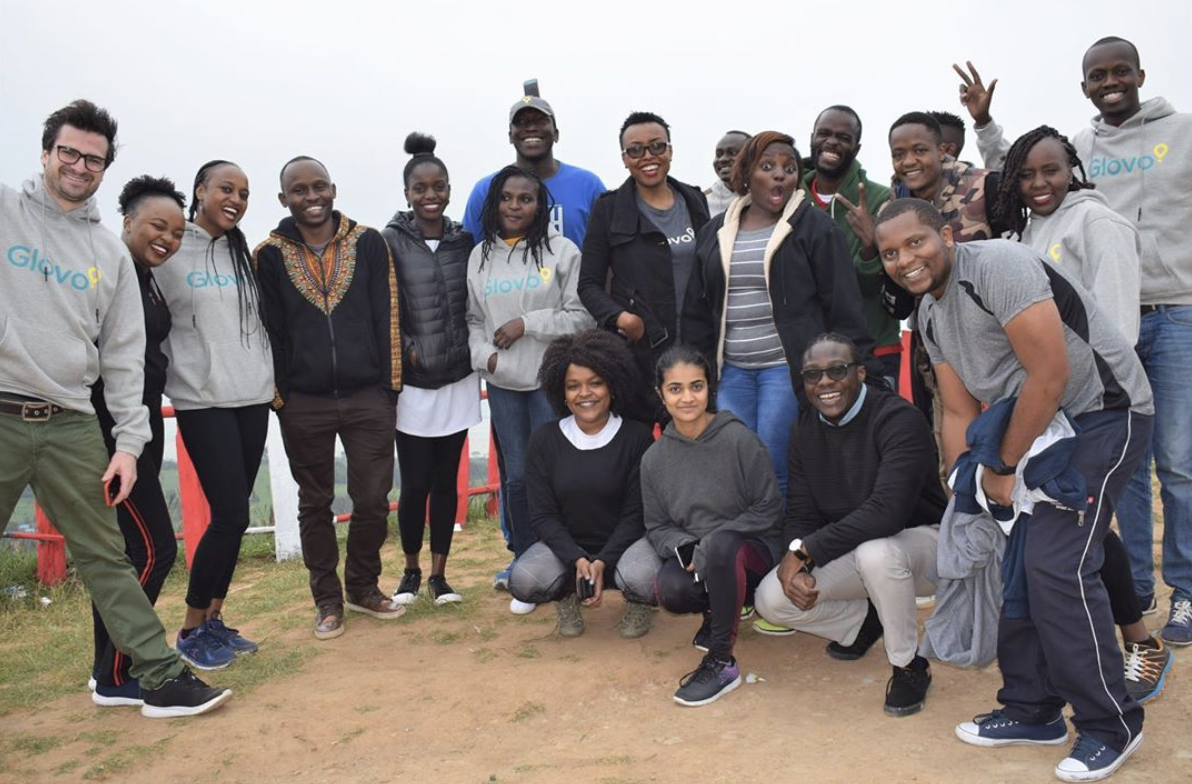
|
|---|
| At Glovo we #Care, we build solutions thinking about their wider impact on our stakeholders globally. |
At the quarterly performance review, we give feedback to employees on culture fit. At Glovo, even all corporate parties are called “culture day”. They follow the general scenario: the CEO presents the results, then there is a block devoted to culture, its manifestations, and only then the party itself.
With the growth of the organization, it is very difficult to maintain the culture of the organization at the level at which it was 2 years ago. I see this even in Ukraine. It's one thing if you are 10 people team sitting in the same room. When you grow beyond 100 employees, the first challenge already appears. How to make sure that for people the values of Glovo are not just some kind of slides or manifestos divorced from reality? How to make people believe in these values and follow them? This is a big challenge.
– How many people are working at Glovo in Ukraine?
– Approximately 70 people.
– How to get to work at Glovo?
– Usually we post all the open positions on LinkedIn. All vacancies are there. By the way, the vacancy of the Chief accountant is now open in Ukraine. Also Glovo is quite open about international moves. We have many people with different nationalities working in different countries.
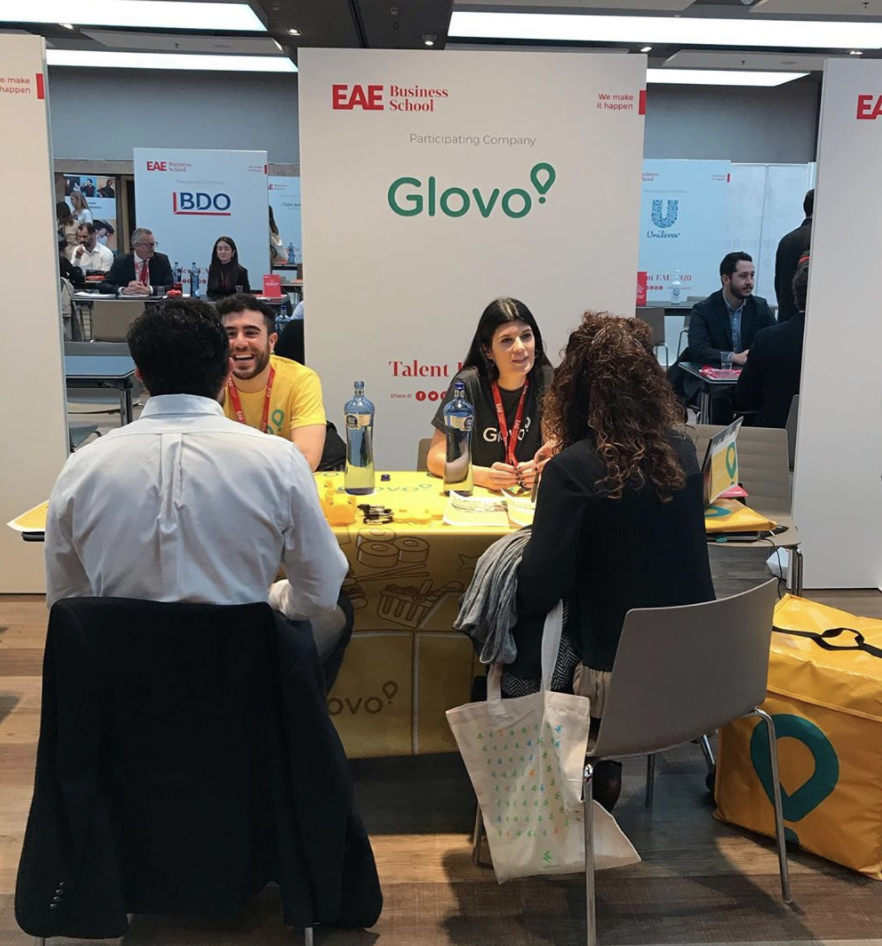
|
|---|
| Glovo Talent Day 2020 |
– How do you keep fit? Do you play any sports?
– Sport is a big part of my life. I believe that sport helps a lot in terms of efficiency. Now in the quarantine period I run almost every day. Also I go in for boxing. We meet with a coach in a forest outside of the city, we take paws and all things, we train. I ran 7 marathons in my life. I invested a lot of time in sports.
– Would you recommend any particular sport?
– I recommend everyone to engage in the sport that he likes. Some people like to jump the rope, some people play badminton. At some point, sport becomes a drug that you cannot quit, you cannot refuse it. I recommend everyone to do what brings pleasure. I can’t say that some kind of sport is better than another. I go to the club on Osokorky - Dog. They have good coaches.

|
|---|
I have been actively involved in sports since school years. I am a candidate for a master of sports in cross-country skiing, a master of sports in mountain tourism, I played for the football team of the school and university.
Now many trainers are ready to work online. Turn on Zoom – and a person will work with you for very reasonable money. I think it is important to start. Do not think for a long time. Get out to the street and run a few kilometers. Or stand up and say: “From now on I will do 100 push ups every day.” The most difficult thing is to take the first step, and then it’s easier.
The most difficult thing is from 0 to 1.
If you think for a long time: “Oh, I have the wrong sneakers. Oh! The weather is bad today", – You will never start. Just do it.
Both business and sport are all about the culture of action.

